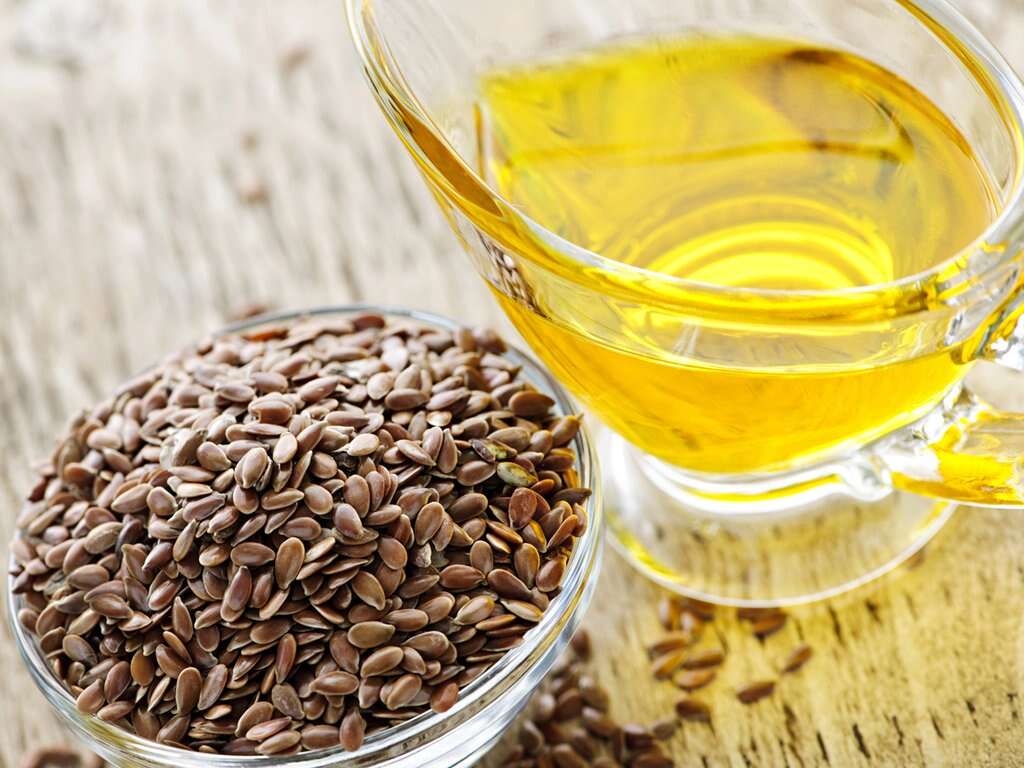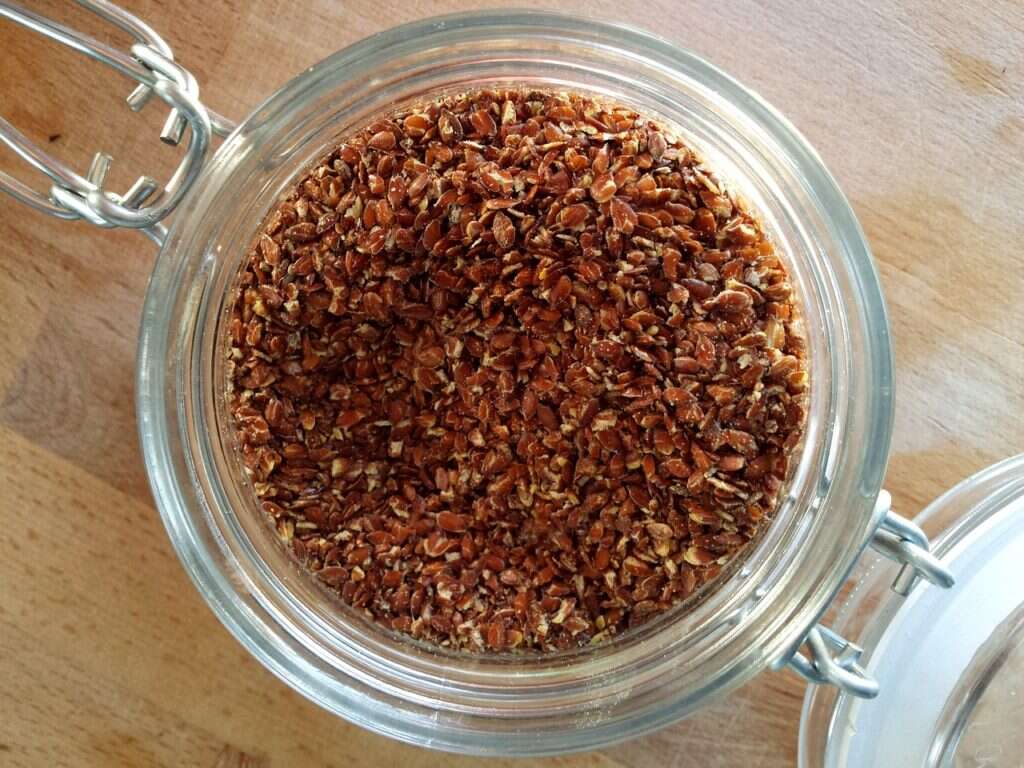10 Benefits of Flaxseed
Flaxseed, which comes from flax or linseed, is a perennial plant with blue, white, yellow, and red flowers typically found and cultivated in cooler regions. Flaxseed is small, flat, ovular shaped seed of a tan to brown hue. It can be ground or cold pressed into an oil, making flaxseed a very versatile ingredient in food and cooking. Flaxseeds are mainly consumed for their health benefits.
In ancient Egypt, flax was used extensively with priests and the upper classes, since it was considered a symbol of purity. During the time, the use of the seeds was not widespread and generally limited to animal feed. Throughout the middle ages, flaxseed was prescribed for gastrointestinal disorders due to its laxative properties, but it wasn’t until the last three decades that it has had an increased focus and study as part of the human diet.

Flaxseed Benefit #1: Aids in Weight Loss
For the individual utilizing exercise with diet for weight loss, flaxseed is a phenomenal low carb source of energy. 100g of ground flaxseed contains 538 calories, making it an incredibly calorie rich food, providing energy to keep your body going.
Flaxseed is particularly high in fiber, which is crucial to weight loss. Per 100g of flaxseed, there are 27.3 grams of fiber, making it one of the top 5% richest foods in fiber content. Additionally, flaxseed aids in weight loss by binding with water in the digestive tract, making you feel fuller for a longer period of time. Thus, preventing overeating.

Flaxseed Benefit #2: Lowers Blood Pressure
Studies have shown the benefits of regularly consuming flaxseed and blood pressure. One third of Americans have high blood pressure, which can lead to further heart problems. Daily consumption of flaxseeds may help keep systolic and diastolic blood pressures under control. A series of clinical trials showed that eating flaxseed daily for 12 weeks lowered systolic blood pressure by 3 points, and diastolic blood pressure by 2 points.
Compared to flaxseed oil, ground flaxseed seems to have a generally greater effect on blood pressure. Flaxseed is rich in alpa linoleic acid (ALA), an omega 3 fatty acid, which is a component in reducing blood pressures.

Flaxseed Benefit #3: Hair Growth
The omega 3 fatty acids found in flaxseed can help with slowing down the progression of alopecia, a type of hair loss most commonly seen with genetics, aging, and/or stress. The fatty oils can help increase oil production from the sebaceous glands, which means the scalp may begin to produce more bodily oils crucial to proper skin and hair health.
Lignan, a polyphenol found in plants including flaxseed, has been suspected to retain anti-inflammatory and antioxidant properties in humans, ultimately helping to diminish factors that contribute to hair loss. Hair loss occurs as testosterone converts into the hormone DHT. Flaxseed lignans have been shown to inhibit this process by preventing production of the enzyme that converts testosterone to DHT.

Flaxseed Benefit #4: Reduce Cancer Risks
Flaxseed has been under investigation for its antioxidant properties due to the presence of structural compounds called phenols, primarily found in plants. The polyphenol lignin is suspected to have antioxidant properties based on its anti-photooxidation and resistance to some diseases.
Lignan is also believed to be a phytoestrogen, a plant nutrient that mimics estrogen. This allows flaxseed to alter estrogen metabolism and reduce the risk of developing breast cancer for postmenopausal women. Other evidence suggests that flaxseed lignans decrease excessive cell growth in breast tissue by increasing apoptosis, a natural process of programming cells to die so that new cells can take their place.

Flaxseed Benefit #5: Control Blood Sugar
Another benefit to consuming flaxseed is that it can help to control blood glucose levels. The Chinese Academy of Medical Science conducted a study on flaxseed to see its effects on cholesterol and glucose levels. The study concluded that flaxseed had consistently positive effects on lower fasting blood glucose levels as well as cholesterol, over a 6-week period.
The reason being that flaxseed, like most plants, contains fiber and the glycoprotein mucilage, which when in contact with water, bloat up and expand in the digestive tract. Although flaxseed may be beneficial for blood sugar control in person’s without diabetes, the found that it did not have an effect on those with type two diabetes. Therefore, consuming flaxseed can be a preventative measure against getting diabetes but is not a treatment for the condition.

Flaxseed Benefit #6: Versatile
Adding flaxseed to your diet, may seem like a daunting task or maybe you feel clueless towards how to incorporate it into everyday meals. Flaxseed is wonderfully versatile and subtle, making it an easy addition to most dishes and flavor combinations ranging from fruit, yogurt, soups and stews, pastries, and a variety of cereals.
Flaxseed can be bought as an oil, ground, or whole, making the possibilities vast. Flaxseed has a nutty, subtle flavor that can pair with sweet, savory, and sour dishes. Try mixing 1-3 tablespoons with yogurt or a smoothie daily. It’s an easy way to start your day with healthy dose of omega 3. Another easy way to get flaxseed oil in your diet is to drizzle it on top of a salad or some grilled vegetables instead of dressing.

Flaxseed Benefit #7: Lower Cholesterol
Omega 3 oils have been shown to lower LDL cholesterol as well as HDL cholesterol levels. One great source of omega 3 is flaxseed oil. What makes flaxseed special, is that it contains a high concentration of ALA, producing a lower inflammatory response while lower cholesterol levels than the other omega 3 fatty acids.
Cold pressed flaxseed oil has 7.3 grams of ALA in just one tablespoon of oil. Flaxseeds and flaxseed oil are both rich in omega 3 with the oil being a richer, more concentrated source. By themselves, flaxseeds have 2.3 grams of ALA in one tablespoon.

Flaxseed Benefit #8: Aids Digestion
Historically, flaxseed has been used to relieve constipation and improve overall digestive health. The soluble fiber content of flaxseed alone makes it a powerhouse food for regulating hunger, as well as bulking stool sizes for a healthier colon. The ALA further contributes to digestive regularity by lubricating the GI tract.
The recommendation is to consume ground up flaxseed to help with constipation or other motility related issues. Eating whole flaxseed is not easily digested, preventing your body from reaping the benefits of the fiber lost. Although it may relieve minor intestinal hinderance, flaxseed may worsen constipation if not consumed with plenty of water.

Flaxseed Benefit #9: Mental Health
Recent studies have found that omega 3 deficiencies may be a culprit in depression and other related mental health conditions such as ADHD/ADD and anxiety. Individuals with various mental health disorders generally tested lower in omega 3.
In children with ADHD, flaxseed and vitamin C supplementation worked together to improve self-control, restlessness, inattention, and impulsiveness. Supplementing flaxseed oil and fish oil with prescription medication treatment had an overall better prognosis than those treated with only therapy or medication. Flaxseed is not a cure-all for mental health, but it can be a stepping stone to correcting imbalances in the brain.

Flaxseed Benefit #10: Skin Health
Flaxseed and its oil contain several skin-friendly nutrients that can help improve the appearance and health of skin. Dry skin can come in various forms from eczema to psoriasis and rosacea. The ALA from flaxseed hydrates and moisturizes the skin to eliminate dry skin. Plus, eating flaxseed causes your body to increase natural oil, sebum, production. Through controlling sebum levels, flaxseed is able to prevent the onset of acne without drying out the skin.
In addition, the characteristics of omega 3 results in the anti-inflammatory property of flaxseed. Regular consumption of flaxseed and flaxseed oil minimizes skin irritation, rashes, inflammation, and redness.












